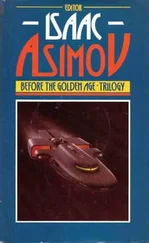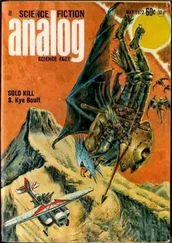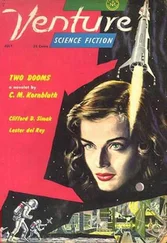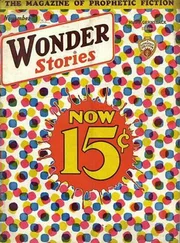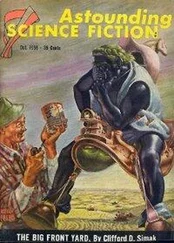Clifford Simak - The Werewolf Principle
Здесь есть возможность читать онлайн «Clifford Simak - The Werewolf Principle» весь текст электронной книги совершенно бесплатно (целиком полную версию без сокращений). В некоторых случаях можно слушать аудио, скачать через торрент в формате fb2 и присутствует краткое содержание. Жанр: Фантастика и фэнтези, на английском языке. Описание произведения, (предисловие) а так же отзывы посетителей доступны на портале библиотеки ЛибКат.
- Название:The Werewolf Principle
- Автор:
- Жанр:
- Год:неизвестен
- ISBN:нет данных
- Рейтинг книги:3 / 5. Голосов: 1
-
Избранное:Добавить в избранное
- Отзывы:
-
Ваша оценка:
- 60
- 1
- 2
- 3
- 4
- 5
The Werewolf Principle: краткое содержание, описание и аннотация
Предлагаем к чтению аннотацию, описание, краткое содержание или предисловие (зависит от того, что написал сам автор книги «The Werewolf Principle»). Если вы не нашли необходимую информацию о книге — напишите в комментариях, мы постараемся отыскать её.
The Werewolf Principle — читать онлайн бесплатно полную книгу (весь текст) целиком
Ниже представлен текст книги, разбитый по страницам. Система сохранения места последней прочитанной страницы, позволяет с удобством читать онлайн бесплатно книгу «The Werewolf Principle», без необходимости каждый раз заново искать на чём Вы остановились. Поставьте закладку, и сможете в любой момент перейти на страницу, на которой закончили чтение.
Интервал:
Закладка:
'Never mind, said Wilson. 'Just go ahead and answer.
'Well, said Blake, 'I guess it was a dirty trick. We both felt badly after we had done it. We never told anyone. Charley stole a hypodermic from his father — his old man was a doctor, I suppose you know.
'I don't know a thing, said Wilson.
'Well, we took this syringe and we had a jar of kerosene and we gave each of the melons a squirt of kerosene. We poked the needle through the rind. Not much, you understand. Just enough so the melons would have a funny taste.
Wilson laid down the paper and picked up the other envelope.
'You passed the test, he said. 'I guess that this is yours.
He handed the envelope to Blake.
Blake took it and saw that there was writing on its face — the words formed in the shaky penmanship of the very old, the ink faded to a faint, dull brown.
The writing said:
To The Man Who Has My Mind
And underneath that line a signature:
Theodore Roberts
Blake's hand shook and he let it fall straight to his side, still clutching the envelope, and he tried to hold it stiff and straight so it would stop its shaking.
For now he knew — now he knew again, now it was all there, all the things he had forgotten, all the old identities and faces.
'That is me, he said, forcing his stiff lips to move. 'That was me. Teddy Roberts. I am not Andrew Blake.
28
He came to the great iron gates, which were locked, went through the postern gate and found the gravel path that went winding up the rise. Below him lay the town of Willow Grove and here, all about him, their places marked by the canted, moss-grown stones, hemmed in by the pines and the ancient fence of iron, lay all those old ones who had been young when he had been a boy.
'Follow the path to the left," Wilson had told him. 'You'll find the family plot halfway up the hill, just to the right. But Theodore, you know, is not really dead. He's in the Mind Bank and he's in you as well. It's just his body up there. I don't understand.
'Nor do I, said Blake, 'but I feel I have to go.
And so he'd gone, climbing the steep, rough road, seldom used, to the cemetery gates. And as he climbed the hill he thought that, of all the town, the cemetery looked the most familiar to him. The pine trees, inside the iron fence, were larger and taller than he'd remembered them and, if possible, even in the full light of the day, were darker and more sombre than he had thought they'd be. But the wind, moaning through their heavy needles, played a dirge that came straight out of boyhood memories.
Theodore, the letter had been signed. But it had not been Theodore, rather it was Teddy. Little Teddy Roberts, and later on, still Teddy Roberts, young physicist out of Caltech and MIT, before whom the universe had lain a bright and shining mechanism that cried for understanding. The Theodore would come later — Dr Theodore Roberts, an old and weighty man, with slow step and ponderous voice, and with his hair turned white. And that was a man, Blake told himself, he had never known and would never know. For the mind he carried, the mind that had been impressed upon his synthetic brain, inside his synthetic body, had been the mind of Teddy Roberts.
Now all he needed to do to talk with Teddy Roberts was to pick up a phone and dial the Mind Bank number and identify himself. And then, with a little wait, perhaps, there would be a voice and behind the voice the mind of Theodore Roberts. But not the voice of the man himself, for the voice had been lost in death; nor the mind of Teddy Roberts, but the older, wiser, more steady mind that had grown from the mind of Teddy Roberts. It would do no good, be thought; it would be a stranger talking. Or would it? For it had been Theodore, not Teddy, who had written him the letter, a man writing from his deep old age, the feeble, shaky hand spelling out the greeting and the message.
Could the mind be man? Or was the mind a lonely thing that stood apart from man? How much of man was mind, how much was the body? And how much of humanity did he, himself, represent when he resided as a simple human notion inside of Quester's body — how much less, perhaps, inside of Thinker's body? For Thinker was a being from far outside the human concept, a biological engine that converted energy, with senses that did not entirely correspond with the human sense, with a logic-instinct-wisdom that took the place of mind.
Inside the postern gate he halted and stood in the deep shadow of the pines. The air was heavy with the scent of evergreen and the wind was moaning and far up the hill a man was working among the moss-grown slabs of granite, the sun flashing on the tool he used as he laboured in the quietness of the morning light.
The chapel stood beside the gate, the ancient clapboard whiteness of its walls shining in the green shadows of the pines, its steeple stretching upwards, trying, but failing, to match the tallness of the trees. Through the open door, Blake glimpsed the soft glow of lights within.
Walking slowly, Blake went past the chapel and started up the walk. Beneath his feet the gravel grated as it shifted. Halfway up the hill and to the right. And when be got there he'd find the marker that proclaimed quietly to the world that the body of Theodore Roberts lay in the earth beneath.
Blake hesitated.
Why did he want to go?
To visit the place where lay his body — no, not his body, but the body of the man whose mind he wore.
And if that mind were still alive — if two minds were still alive — what did the body matter? It was a husk and its death should occasion no regret and its resting place was of no consequence.
Slowly he turned back down the path, heading for the gate. When he reached the chapel, he stopped and stood looking, through the gate, down upon the town.
He was not ready to go back to the town, he knew — if he ever should be ready. For when he walked into that town again, he must know what to do. And he did not know what to do. He had no ideas what to do.
He turned and went up the walk to the chapel and sat down on the steps.
What should he do now? he wondered. What was left to do?
Now, finally, knowing who he was, there was no further need of running. Now he had the ground to stand on, but the ground was meaningless.
He reached into the pocket of his robe and took out the letter. Unfolding it, he sat hunched upon the step, going over it again:
My dear Sir: Which, I suppose, may be a strange and awkward way of addressing you. I have tried other salutations and all of them sounded wrong. I must fall back upon the one which, while it may seem too formal, at least is dignified.
By now, of course, you know who I am and who you are, so there is no need for any explanation concerning our relationship, which I take to be the first of its kind upon this earth, and perhaps a bit embarrassing to the both of us.
I have lived in hope that some day you would be back and the two of us might sit down, perhaps with drinks in hand, and spend a pleasant hour in comparing notes.
Now I have some fear that you may not be coming back. Since you have been gone so long, I fear something may have happened that will prevent your coming back. But even if you did, for me to see you your coming must be soon, for the end of life draws near.
The end of life, I say, and yet this is not entirely true. The end of life, of course, so far as I am physically concerned. But my mind will continue to exist in the Intelligence Depository — one mind among many others, able to continue functioning as an independent unit, or acting in collaboration, as a sort of panel or advisory board, with other minds which are existing there.
It has been with some hesitation that I have finally accepted the nomination. I realize, of course, the honour of it, but even having accepted, I am not convinced of the wisdom of it, either for myself or for humanity. I am not certain that a man can live comfortably as a mind alone, and I am afraid, as well, that humanity, in time, may come to depend too heavily upon the accumulated wisdom and knowledge which is contained within the so-called Mind Bank. If we remain, as is the situation today, simply as an advisory board to which questions may be submitted for consideration and recommendation, then the Bank may serve a useful purpose. But if the world of men ever comes to depend upon the wisdom of the past alone, glorifying it or deifying it, bowing to it and ignoring the wisdom of their present, then we will become a hindrance and a detriment.
Читать дальшеИнтервал:
Закладка:
Похожие книги на «The Werewolf Principle»
Представляем Вашему вниманию похожие книги на «The Werewolf Principle» списком для выбора. Мы отобрали схожую по названию и смыслу литературу в надежде предоставить читателям больше вариантов отыскать новые, интересные, ещё непрочитанные произведения.
Обсуждение, отзывы о книге «The Werewolf Principle» и просто собственные мнения читателей. Оставьте ваши комментарии, напишите, что Вы думаете о произведении, его смысле или главных героях. Укажите что конкретно понравилось, а что нет, и почему Вы так считаете.

